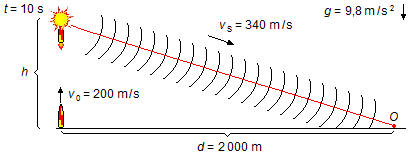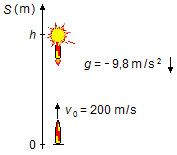Solved Problem on One-dimensional Motion
advertisement
A rocket is launched vertically from the ground at an initial speed of 200 m/s, after 10 seconds it explodes. A ground observer is located at a distance of 2000 meters in the same horizontal as the launch point. After how long he will hear the blast noise? The speed of sound in the air is 340 m/s.
Problem Data:
- Initial speed of rocket: v0 = 200 m/s;
- Time to explosion: t = 10 s;
- Distance from observer to launch point: d = 2000 m;
- Acceleration due to gravity: g = 9,8 m/s2;
- Speed of sound in air: vs = 340 m/s.
The rocket rises to a height h where it explodes, the sound of the blast traveling through the air for a time interval ts until it reaches a ground observer (Figure 1).

Solution
First, we must find the height reached by rocket. We choose a frame of reference in an upward direction
(Figure 2).
The motion of the rocket is a vertical lauch, the height h of the explosion will be given by
The motion of the rocket is a vertical lauch, the height h of the explosion will be given by
\[
\begin{gather}
\bbox[#99CCFF,10px]
{S=S_0+v_0 t-\frac{g}{2}\;t^2}
\end{gather}
\]
where the acceleration due to gravity has a negative sign because it has the opposite direction of the
frame of reference, in the equation S=h and S0}=0

\[
\begin{gather}
h=0+\left(200\;\mathrm{\small{\frac{m}{\cancel s}}}\right)\left(10\;\mathrm{\cancel s}\right)-\left(\frac{9.8\;\mathrm{\frac{m}{s^2}}}{2}\right)(10\;\mathrm s)^2\\[5pt]
h=2000\;\mathrm m-490\;\mathrm m\\[5pt]
h=1510\;\mathrm m
\end{gather}
\]
The Pythagorean Theorem gives the distance H from the point of the explosion to the
observer (Figure 3)
\[
\begin{gather}
H^2=(1470\;\mathrm m)^2+(2000\;\mathrm m)^2\\[5pt]
H^2=2160900\;\mathrm{m^2}+4000000\;\mathrm{m^2}\\[5pt]
H=\sqrt{6160900\;\mathrm{m^2}\;}\\[5pt]
H\approx 2482\;\mathrm m
\end{gather}
\]

The gravitational field does not act on the sound wave, it moves at a constant speed. We choose a frame of reference with the origin at the point where the explosion occurs and oriented in the direction of the man (Figure 5).

Since S = 2482 m e S0 = 0, the equation of displacement as a function of time will be given by
\[
\begin{gather}
S=S_0+v_{\small S} t_{\small S}\\[5pt]
2482\;\mathrm m=0+\left(340\;\mathrm{\small{\frac{m}{s}}}\right)t_{\small S}\\[5pt]
t_{\small S}=\frac{2482\;\mathrm{\cancel m}}{340\;\mathrm{\frac{\cancel m}{s}}}
\end{gather}
\]
\[
\begin{gather}
\bbox[#FFCCCC,10px]
{t_{\small S}\approx 7.3\;\mathrm s}
\end{gather}
\]
advertisement

Fisicaexe - Physics Solved Problems by Elcio Brandani Mondadori is licensed under a Creative Commons Attribution-NonCommercial-ShareAlike 4.0 International License .